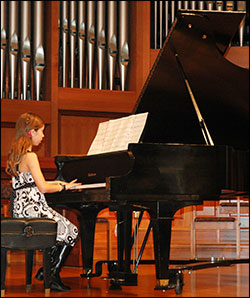
 |
 |
Music to My Ears
 Samantha at a Spring 2012 recital Samantha at a Spring 2012 recitalMy daughter Samantha was a later identified child. She was two before we officially determined there was a hearing loss. Looking back it seems so long ago but in reality it’s been only eight years. She has Enlarged Vestibular Aqueduct Syndrome or EVAS, sometimes LVAS in its shorthand form. Our family decided at that point, when she had a mild to moderate loss, that we would use an oral mode of communication. She didn’t have much language at the time of identification, but she did extremely well once hearing aids were introduced. Since then, her hearing deteriorated to profound loss, and at age seven she was implanted with her first implant with a second at age eight. Samantha turned out to be an auditory learner. (Go figure, right?) We became aware of this when we attempted signing with her, which was not an easy task when she wouldn’t look at us. She has always loved music. Her favorites are anything from Beethoven to the Beatles to Lady Gaga. Her most favorite is Bon Jovi. We used to just smile listening to her belt out a Bon Jovi tune from the back seat. I’ve still yet to send a letter to Bon Jovi telling him of her love of his music. She took a liking to keyboards at a very young age so we bought her a little toy one. She would push at the keys now and again but she seemed to enjoy the recorded song buttons that would play a tune with one easy press. We decided to buy a more advanced decent keyboard for Christmas when she was eight; it too had those pre-recorded tunes that she would play all the time. I felt like we were going through batteries left and right but she loved the sound and it was good for her to listen to good piano music. “Go with what they show you to be their interests; you’ll be rewarded with a happy successful child.”
On any ordinary day I heard those tunes playing for long periods of time. One day I heard the tune slowing down and thought to myself that I had better change the batteries. So I called up to her room and asked her to bring me the piano so I could change the batteries. Thinking nothing of it, she brought it down and I changed them. She returned to her room and I heard the music again, still at a slow tempo. ‘I must have had a bad batch of batteries,’ I thought, running upstairs with new ones. I was astonished to find that my “deaf” daughter was playing those tunes by ear on that little piano. It wasn’t weak batteries; it was her playing what she heard, exactly as it sounded and just a tiny bit slower. I was blown away. I made her play those tunes again-- all five of them—and she played without error. How could this be? I had read so much about implant processors lacking musical quality… I didn’t think this was possible. Realizing that this was a gift we should encourage, Samantha has been playing the piano formally for the past two years. She is a quick learner and very dedicated. She plays with sheet music now but she still will try to master a tune. Her current piece to tackle by ear is “100 Years” by Five for Fighting. Last summer she also chose to play the cello. She just loves it. So, next time you think that hearing loss can slow your child down, think again. Kids are resilient and will do whatever their calling is; hearing loss doesn’t slow them down. Go with what they show you to be their interests; you’ll be rewarded with a happy successful child. For reference Ludwig Van Beethoven was a late deafened adult. From what I’ve read, he struggled with his hearing loss, which fluctuated for some time before he lost his hearing completely. He was a virtuoso performer before his hearing began to change in his late 20’s, but he embraced composing as a full time career when he came to terms with his hearing loss. Many of his famous works were composed after he began to lose his hearing, and Symphony No. 9 was composed while he was completely deaf. For Beethoven, and for our kids, passion will find a way. |
| Copyright 2014 Hands & Voices :: Privacy Policy :: Credits |